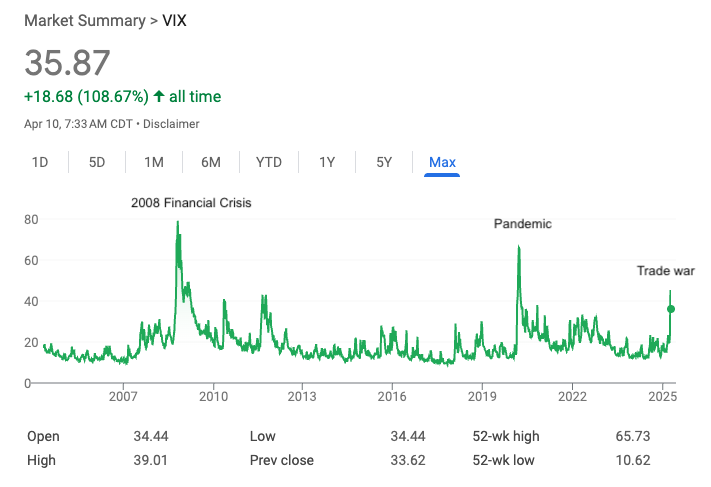Talk About Market Uncertainty. After plunging for several days, stocks soared Wednesday afternoon after President Trump announced a tariff pause.
 Bullion.Directory precious metals analysis 10 April, 2025
Bullion.Directory precious metals analysis 10 April, 2025
By Mike Maharrey
Journalist, analyst and author at Money Metals Exchange
The S&P 500 rocketed 9 percent, charting its third-largest single-day gain since World War II.
Gold also whipsawed, having dipped below $3,000 an ounce, the yellow metal regained much of its loss and closed over $3,100.
It’s hard to get a handle on what will happen next.
The only thing that seems certain is uncertainty.
Market volatility skyrocketed with the launch of the trade war. The VIX volatility index spiked to 57.85 on April 9. For perspective, it rose to 66 during the early days of the pandemic and 79 in October of 2008.

While the volatility index cooled somewhat after the announcement of the tariff pause, there is still plenty of uncertainty and jitteriness in the market. We’re just one announcement away from another round of market chaos.
Do you know what markets and businesses don’t like?
Uncertainty.
What Is Regime Uncertainty
We are in a period of extreme regime uncertainty. Whether you’re an investor, a business owner, or an entrepreneur, it’s extremely difficult to plan for the future under these conditions.
Regime uncertainty describes a lack of confidence in the direction of a government’s future policies regarding taxes, regulations, and, in more extreme situations, the protection of property rights and the consistent application of the rule of law.
When people become unsure about what the government will do next, or if they fear a sudden shift in rules, it discourages long-term investment and economic activity.
Regime uncertainty tends to foster “analysis paralysis.” People fixate on trying to figure out what might happen next and end up doing nothing, instead taking a “wait and see” attitude.
For instance, during the Great Depression, President Franklin D. Roosevelt created a great deal of regime uncertainty as he implemented the New Deal. Regulations and policies turned on a dime. Businesses became unsure about the federal government’s increasing intervention in the economy through price controls, taxes, labor laws, and other economic policies.
Economist Robert Higgs argued that this “regime uncertainty” prolonged the Great Depression by discouraging private investment. As he put it, “Between 1935 and 1940, this matter attained prime importance. So many businessmen and investors lost confidence in their ability to forecast the future property-rights regime that few were willing to venture their money in long-term investments.”
The bottom line is that long-term economic growth depends on predictable rules. Sudden shifts in taxation, regulation, or property rights make businesses defensive.
While not rising to the level of FDR, Trump’s negotiating tactics are a breeding ground for regime uncertainty. Will the 90-day pause really last 90 days? Will exceptions be introduced? What happens in 90 days?
Nobody knows.
Navigating Regime Uncertainty
How do you navigate this kind of uncertainty?
If you’re running a business, especially one that relies on imports, I don’t know what to tell you.
But investors can weather this storm by keeping a few things in mind.
- Don’t panic. You’re going to see big swings in the market. Resist the temptation to react knee-jerk to the daily roller coaster ride. It’s easy to get caught up in emotion. Don’t.
- Focus on fundamentals. The trade war is happening within a broader context. Those fundamentals remain in place. We still have an inflation problem. We still have de-dollarization. We still have a lot of bubbles in the market. We still have massive amounts of debt. The laws of supply and demand remain firmly in place. It’s important to focus on the big picture and not get too caught up in the latest headline.
- Gold and silver are a beacon of stability. That’s not to say that the price won’t swing wildly from day to day. But gold and silver are fundamentally money. They have been money for over 5,000 years, and they will continue to be money when the trade war is a distant memory. Gold and silver are the ultimate safe haven bids. They are generally insulated from regime uncertainty because there is no counterparty risk.
There is no telling what tomorrow will bring.
But you can be sure that gold and silver will still be valued and desired around the world.
Mike Maharrey


Mike Maharrey is a well-known author, journalist, financial analyst and writer at Money Metals Exchange, one of our top-rated US dealers and two-times winner of Bullion Dealer of the Year
He holds a BS in accounting from the University of Kentucky and a BA in journalism from the University of South Florida. Mike also serves as the national communications director for the Tenth Amendment Center and the managing editor of the SchiffGold website.
This article was originally published here
Bullion.Directory or anyone involved with Bullion.Directory will not accept any liability for loss or damage as a result of reliance on the information including data, quotes, charts and buy/sell signals contained within this website. Please be fully informed regarding the risks and costs associated with trading in precious metals. Bullion.Directory advises you to always consult with a qualified and registered specialist advisor before investing in precious metals.











 Material provided on the Bullion.Directory website is strictly for informational purposes only. The content is developed from sources believed to be providing accurate information. No information on this website is intended as investment, tax or legal advice and must not be relied upon as such. Please consult legal or tax professionals for specific information regarding your individual situation. Precious metals carry risk and investors requiring advice should always consult a properly qualified advisor. Bullion.Directory, it's staff or affiliates do not accept any liability for loss, damages, or loss of profit resulting from readers investment decisions.
Material provided on the Bullion.Directory website is strictly for informational purposes only. The content is developed from sources believed to be providing accurate information. No information on this website is intended as investment, tax or legal advice and must not be relied upon as such. Please consult legal or tax professionals for specific information regarding your individual situation. Precious metals carry risk and investors requiring advice should always consult a properly qualified advisor. Bullion.Directory, it's staff or affiliates do not accept any liability for loss, damages, or loss of profit resulting from readers investment decisions.

Leave a Reply